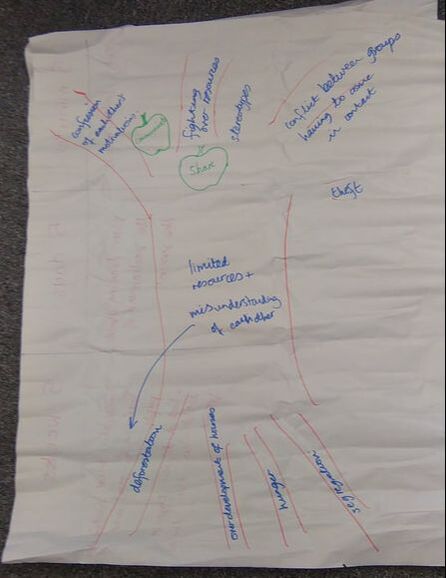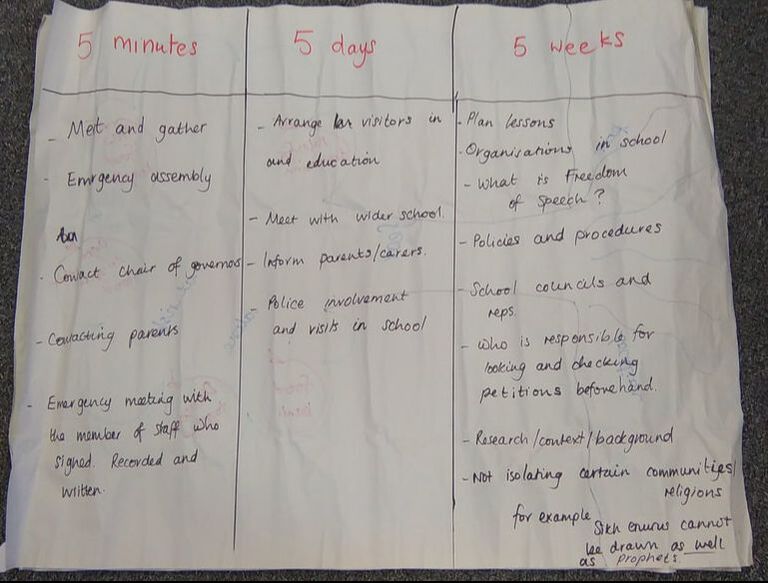Dealing with Controversial Issues
How do we know when a controversial issue is going to arise? What counts as a controversial issue? Surely it’s best just to avoid these conversations. Whether prepared for the challenge or not, every educator is met with unexpected, tricky moments or conversations at times, whether in the classroom, playground, in the corridor or school gate. How do you prepare for these events and is it possible to do so?
Controversial issues cover a vast array of topics and are characterised by having a political, social, emotional or personal dimension, layers of complexity, divergence of opinion and potential to be triggered by small local or major global events – past, present or future. Avoidance isn’t possible!
The idea behind Thinking Otherwise is to provide pathways into dealing with what may be termed “controversial issues.” Creating stimulating opportunities to raise questions, engage in dialogue, listen respectfully and realise that there can be many perspectives on any issue – whether considered controversial or apparently unproblematic. After all, what may seem a small matter to one person can appear like an unsurmountable mountain to someone else.
How do we know when a controversial issue is going to arise? What counts as a controversial issue? Surely it’s best just to avoid these conversations. Whether prepared for the challenge or not, every educator is met with unexpected, tricky moments or conversations at times, whether in the classroom, playground, in the corridor or school gate. How do you prepare for these events and is it possible to do so?
Controversial issues cover a vast array of topics and are characterised by having a political, social, emotional or personal dimension, layers of complexity, divergence of opinion and potential to be triggered by small local or major global events – past, present or future. Avoidance isn’t possible!
The idea behind Thinking Otherwise is to provide pathways into dealing with what may be termed “controversial issues.” Creating stimulating opportunities to raise questions, engage in dialogue, listen respectfully and realise that there can be many perspectives on any issue – whether considered controversial or apparently unproblematic. After all, what may seem a small matter to one person can appear like an unsurmountable mountain to someone else.
|
Young people are looking for opportunities to discuss issues, so it is advisable to provide a supportive structure where questions can be asked and views expressed – rather than driving talk underground. The discussion will happen anyway. Why not use it to explore values, enhance communication skills, build understanding and learn that life is complex with no easy answers.
Exploration of controversial issues provides a context where critical thinking skills, problem solving and creativity can be combined to deepen knowledge, understanding and empathy. If a specific issue is impacting significantly on school life, think about what can be done to engage with the wider community, bring in some expert support, train staff or enhance the curriculum, sooner rather than later. It is best to acknowledge the issue and put together a positive action plan to start to make a difference and resolve the tensions. |
The activities found in this website are designed to create an environment for exploration, discussion encouraging deeper thinking and reflection. Embedding activities within the curriculum which demand critical thinking and ethical engagement with difference helps create an open-minded, caring culture. Start with short, fun activities and build engagement slowly. Do what you and your class feel comfortable with, model listening skills and provide example questions as a starting point, if your students need help to get started.
Use participatory methodologies to explore issues from varied perspectives and to look for reasons why a situation has arisen. What are the causes and what are the effects? How can we think differently about this issue? Is there part of this story that is missing? Why might that be? Asking questions is a non- threatening approach, beneficial in the classroom and, when controversial moments occur at other times, in other places.
Finding ways to provide distance and depersonalise through drama, stories and film are preferable, especially when analysing sensitive issues. However, always be mindful of individuals and their circumstances. Sometimes activities can provoke an emotional response. Make it clear that young people need not participate in the discussion and should only share what they are comfortable with sharing.
Use participatory methodologies to explore issues from varied perspectives and to look for reasons why a situation has arisen. What are the causes and what are the effects? How can we think differently about this issue? Is there part of this story that is missing? Why might that be? Asking questions is a non- threatening approach, beneficial in the classroom and, when controversial moments occur at other times, in other places.
Finding ways to provide distance and depersonalise through drama, stories and film are preferable, especially when analysing sensitive issues. However, always be mindful of individuals and their circumstances. Sometimes activities can provoke an emotional response. Make it clear that young people need not participate in the discussion and should only share what they are comfortable with sharing.
Spaces for Conversation and Dialogue
Here are some ideas for creating a space for discussion and dialogue.
Negotiate ground rules for class discussion, here are some suggestions:
Here are some ideas for creating a space for discussion and dialogue.
Negotiate ground rules for class discussion, here are some suggestions:
|
Useful phrases are a tool that can be used to support controversial or complex conversations. Sentence starters can be a helpful step in discussing sensitive, controversial or complex issues. Use them and encourage your students to use them:
“That’s interesting, because it makes me think …/feel ....”
“To ME it seems / feels / looks ...”
“I’d like to say ... because ...”
“That’s interesting, can you say why ...?”
“I hear what you are saying but I disagree because ...”
Here are some useful facilitation phrases. Helpful for guiding conversations, without judging or closing a conversation down:
“Does anyone else have an opinion on that?”
“Would anyone else like to add anything to that?
“I find what you are saying difficult because .../can you explain why you think that?”
“Does anyone agree/disagree? Can you explain?”
“Comments about .... are hurtful because ...”
(Always explain why – use as a teaching opportunity)

Photo by Thomas Park on Unsplash
|
As educators, we will never have all the answers. However, what we can do is promote an environment where questions, talk and reflection are valued and where multiple perspectives, rather than simplistic views or solutions, are centred. Stepping back, looking at statements or issues from a range of perspectives, visualising ourselves in someone else's shoes and taking time to listen, think and imagine. All these are small steps to empathy and understanding, so the next time a controversial issue arises, we (and our students) are equipped to ask better questions, think things through and engage with complexity and uncertainty more effectively. |
Useful links:
|
Teaching Controversial Issues: A Guide for Teachers
OXFAM (2018) |
Free Resources for Equality, Diversity and Inclusion in Schools
EQUALITEACH |
Sensitive and
Controversial Issues INSTED (Updated Jan 2021) |








